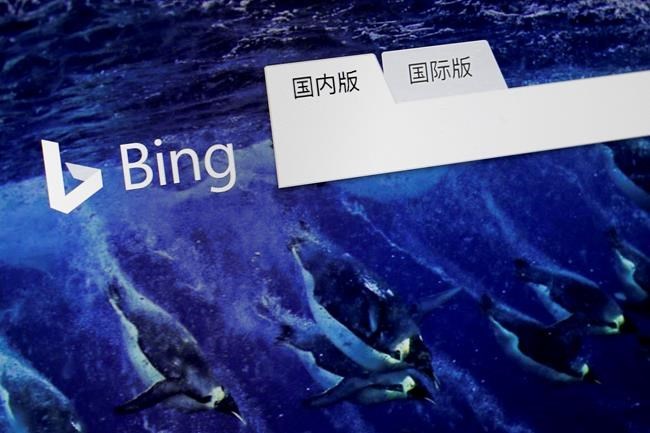
FILE - In this Jan. 25, 2019, file photo, Microsoft Corp.'s Bing search engine page is seen on a computer screen in Beijing. The Australian prime minister said Monday, Feb. 1, 2021, Microsoft is confident it could fill the void if Google carries out its threat to remove its search engine from Australia. A Google executive told a Senate hearing last month that it would likely make its search engine unavailable in Australia if the government went ahead with plans to make tech giants pay for news content. Prime Minister Scott Morrison said he had since spoken to Microsoft chief executive Satya Nadella about its search engine Bing filling the space.(AP Photo/Andy Wong, File)
February 02, 2021 - 9:13 PM
CANBERRA, Australia - Microsoft said on Wednesday it supports Australia’s plans to make the biggest digital platforms pay for news and would help small businesses transfer their advertising to Bing if Google quits the country.
Microsoft has been positioning itself to increase market share for its search engine Bing after a Google executive told a Senate hearing last month that it would likely make its search engine unavailable in Australia if the government goes ahead with a draft law that would make tech giants pay for news content.
Microsoft President Brad Smith said in a statement that he and Microsoft Chief Executive Satya Nadella had told Prime Minister Scott Morrison and Communications Minister Paul Fletcher in an online meeting last week that “Microsoft fully supports” the so-called News Media Bargaining Code.
Morrison this week confirmed he had spoken to Nadella about Bing replacing Google in Australia.
“I can tell you, Microsoft’s pretty confident” that Australians would not be worse off, Morrison said on Monday.
Smith said he had assured the government leaders that small businesses who wished to transfer their advertising from Google to Bing could do so simply and without transfer costs.
“We believe that the current legislative proposal represents a fundamental step towards a more level playing field and a fairer digital ecosystem for consumers, business and society,” Smith said.
Although Bing is Australia’s second most popular search engine, it has only a 3.6% market share, according to web analytics service Statcounter. Google says it has 95%.
Swinburne University senior lecturer on media Belinda Barnet said Bing and other search engines could fill the void left by Google and deliver benefits.
“People need to realize it will not be personalized in the sense that Google advertising in searches is, so Bing doesn’t know and frankly doesn’t care that you’re in the market for yoga pants, for example,” Barnet said.
“Some of these platforms, Google and Facebook in particular, feed you more misinformation if you’re already prone to clicking on misnformation, so they create this echo chamber, in a sense,” she said. “But a product like DuckDuckGo and Ecosia is not going to know that in the past you’ve looked at 100 articles about how vaccines are bad and they will just give you the most accurate information that they can find.”
Peter Strong, chief executive of the Council of Small Business Organizations Australia, an advocacy group, expected the disruption to small businesses created by Google’s departure from Australia would be short lived.
“We're not panicking,” Strong said. “But it would have a short-term impact.”
“It would be a bad thing if Google quits, but if Bing took over, the situation would be the same,” he added. “One organization has the capacity to blackmail a country and that should never happen," he said, calling for more government regulation.
The mandatory code proposed by the government aims to make Google and Facebook pay Australian media companies fairly for using news content the tech giants siphon from news sites.
There are no plans to make smaller search engines such as Bing pay for linking users to Australian news, but the government has not ruled that option out.
Google has faced pressure from authorities elsewhere to pay for news. Last month, it signed a deal with a group of French publishers paving the way for the company to make digital copyright payments. Under the agreement, Google will negotiate individual licensing deals with newspapers, with payments based on factors such as the amount published daily and monthly internet site traffic.
But Google is resisting the Australian plan because it would have less control over how much it would have to pay. Under the Australian system, if an online platform and a news business can’t agree on a price for news, an arbitration panel will make a binding decision on payment.
News from © The Associated Press, 2021